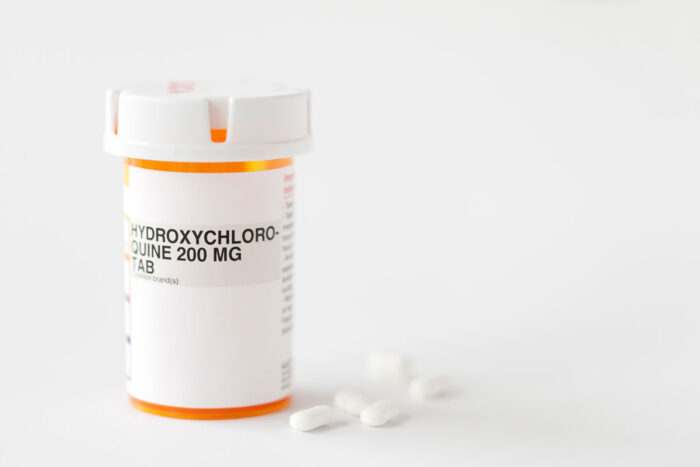Clinical trial launches to evaluate antimalarial drugs for COVID-19 treatment
Cigna/Express Scripts provided the drugs; open to COVID-19 patients at Barnes-Jewish Hospital
 Getty Images
Getty ImagesAntimalarial drug, hydroxychloroquine is one of the drugs being tested in COVID-19 patients.
Washington University School of Medicine in St. Louis is launching a clinical trial for patients hospitalized with COVID-19 at Barnes-Jewish Hospital. The trial will investigate the effectiveness of different combinations of the antimalarial drugs chloroquine and hydroxychloroquine and the antibiotic azithromycin in treating ill patients infected with the novel coronavirus.
Express Scripts, a Cigna company, has donated these medications to the School of Medicine in an effort to accelerate research for a COVID-19 treatment.
The Food and Drug Administration recently gave emergency approval for hospitals across the country to use the two antimalarial drugs to treat severe cases of COVID-19. However, this treatment strategy remains unproven.
“There have been only a few small studies that have evaluated chloroquine and hydroxychloroquine in patients with COVID-19 infection, and the results are unclear,” said infectious disease specialist Rachel M. Presti, MD, PhD, an associate professor of medicine who is co-leading the trial. “We need additional trials to understand whether the drugs are effective. We are pleased to be able to offer this clinical trial to patients with COVID-19 in the St. Louis region. We’re grateful to Cigna and Express Scripts for the generous donation of these drugs. Our goal is to determine if any of these medications, alone or in combination, decrease the severity or duration of respiratory symptoms.”
Respiratory symptoms of COVID-19 include dry cough and shortness of breath. According to the Centers for Disease Control and Prevention (CDC), people should seek medical attention if symptoms progress to difficulty breathing, persistent pain or pressure in the chest, confusion or inability to arouse, and bluish lips or face. This trial is only for patients who are ill enough to be admitted to the hospital. The researchers plan to enroll 500 patients over the course of the study.
“To accelerate research for a COVID-19 treatment, we are supporting one of the top medical schools in the country in their efforts to quickly implement a clinical trial,” said Steve Miller, MD, chief clinical officer, Cigna. “This trial will help to establish whether these drugs are effective and, if so, to determine the optimal doses to help minimize the symptoms of COVID-19.”
Patients with confirmed cases of COVID-19 who choose to enroll in the trial will be randomly assigned to one of four treatment groups: One group will receive chloroquine alone; a second group will receive hydroxychloroquine alone; a third group will receive chloroquine and azithromycin; and a fourth group will receive hydroxychloroquine and azithromycin.
All three medications are generic formulations long used to treat other conditions. Chloroquine and hydroxychloroquine are used for the prevention and treatment of malaria. They also are prescribed, often in combination with other medications, for autoimmune disorders, such as lupus and rheumatoid arthritis. Azithromycin is an antibiotic used to treat many types of infections caused by bacteria, including respiratory, skin, ear and eye infections.
In past research, chloroquine and hydroxychloroquine showed some effectiveness against related coronaviruses MERS and SARS. All three drugs have side effects that are well-known. Hydroxychloroquine and chloroquine in particular can cause heart rhythm problems. Presti said patients will be carefully screened for abnormal heart rhythms before being administered these drugs. These drugs also have been associated with vision loss and psychiatric side effects, but Presti said such effects are not typically seen in short-term use of the drugs.
Presti is co-leading this clinical trial with Jane O’Halloran, MD, PhD, an assistant professor of medicine at Washington University. All COVID-19 related research is coordinated by the COVID task force appointed by David H. Perlmutter, MD, executive vice chancellor for medical affairs and the George and Carol Bauer Dean of the School of Medicine. The task force is led by Jeffrey Milbrandt, MD, PhD, the James S. McDonnell Professor and head of the Department of Genetics; William G. Powderly, MD, the J. William Campbell Professor of Medicine and director of the Institute for Clinical and Translational Sciences (ICTS); and Sean Whelan, PhD, the Marvin A. Brennecke Distinguished Professor and head of the Department of Molecular Microbiology.
The clinical and translational research related to COVID-19 at the School of Medicine harnesses a breadth of resources of the ICTS, which were deployed to bring this study forward in less than two weeks. Washington University’s ICTS is part of the Clinical and Translational Science Award (CTSA) nationwide network funded by the National Center for Advancing Translational Sciences (NCATS).







